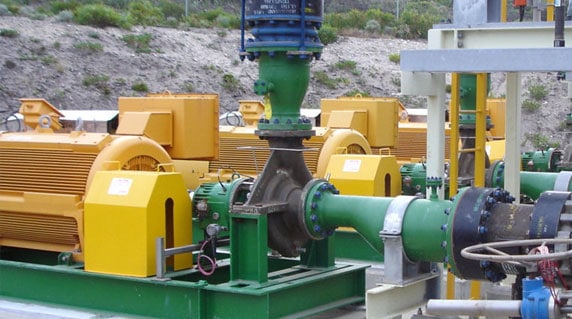A variety of industries rely on slurry pumps, including the mining, dredging, and steel industries. It’s essential to engineer these pumps to heavy-duty specifications, as they have a difficult task to complete. It’s no mean feat to transport slurries, which are abrasive, and tend to cause clogs and excessive damage from wear and tear. To support worry-free operation for years to come, your company can connect with an industrial services partner that provides pump services, such as Campbell Technologies.
Understanding Slurries
In order to fully grasp the unique demands placed on slurry pumps, it’s essential to have a basic understanding of the nature of slurries. Slurry is a fluid blended with a pulverized, non-dissolvable solid. Some slurries are thin, with a low content of solids, while others are quite thick, with a high content of solids. All slurries tend to be corrosive, abrasive, and difficult to transport.
Experts divide slurries into two main categories: settling and non-settling. Non-settling slurries are comprised of fine particles. They are generally less abusive on pumps and pipes. However, they still require a special slurry pump, as they will not behave quite in the same way as a non-slurry fluid. In contrast, settling slurries are comprised of very coarse particles. This unstable blend tends to wear out pumps more quickly. As a result, it’s even more important to select a slurry pump with care.
Exploring Key Characteristics of Effective Slurry Pumps
All slurry pumps must withstand heavy wear and tear due to the nature of the substances they transport. In addition to the heavy-duty construction, a slurry pump should feature a large impeller diameter. The shafts and bearings are typically far more rigid and rugged than those of other pump systems. Overall, slurry pumps tend to be larger than their low viscosity counterparts. In addition, slurry pumps require more horsepower. This is because they are, by nature, less efficient than low viscosity pumps. Note that the lower efficiency is due to the nature of the substance they transport, rather than any defects in design.
Choosing an Ideal Slurry Pump for Your Industrial Site
Industrial site operators have two main approaches to choose from when it comes to selecting a new slurry pump. You can either purchase a slurry pump that has already been designed and manufactured, or you can have one custom-built to suit your site’s particular needs. Regardless of which approach you take, your new slurry pump should have the following characteristics:
- Material: Most slurry pumps are built from high chrome. High chrome is a metal alloy that is comprised of white iron with 25% chromium. The chromium is added to reduce the brittleness of the white iron. High chrome is particularly well-suited to slurry pumps that must transport very abrasive slurries with a neutral pH. If the slurry is abrasive with a low pH, a duplex stainless steel construction is ideal, as it can withstand caustic substances more readily.
- Power Sizing: It’s necessary to conduct an assessment of the power requirements for your particular application. In most cases, an ideal operating range is between 900 and 1200 RPMs. Exceeding 1200 RPMs is generally not recommended, as it will prematurely wear out the pump.
- Type: There are four main types of slurry pumps. They are horizontal, vertical, submerged, and submersible slurry pumps. You will need to choose the right type of construction for your application. For example, a submersible slurry pump is ideal for river dredging and sand excavation, whereas a horizontal slurry pump is often used in coal mines, electric power, and metallurgy.
Extending the Longevity of Your Pump System
It’s no secret that slurry pumps do tend to break down and require replacement more frequently than other types of pump systems. However, there are a few things you can do to get the most life possible out of your pumps. One way to reduce wear and tear damage is to reduce the discharge pressure to the lowest possible point.
In addition, it’s generally best to operate the pump on a slow setting in order to reduce wear. However, be careful not to lower the speed to the extent that solids will settle in the pipes, as this will cause clogging. Lastly, check with your pump services provider to ensure that all proper piping best practices are in place. This will help ensure uniformity in slurry delivery.
Campbell Technologies is a leading provider of complete pump services for mining companies and other industrial sites. We offer a full spectrum of services—from pump repairs to pump rebuilds to custom-designed pump systems. Contact our headquarters in Tucson today at (520) 624-8837 or email [email protected] for more information.

